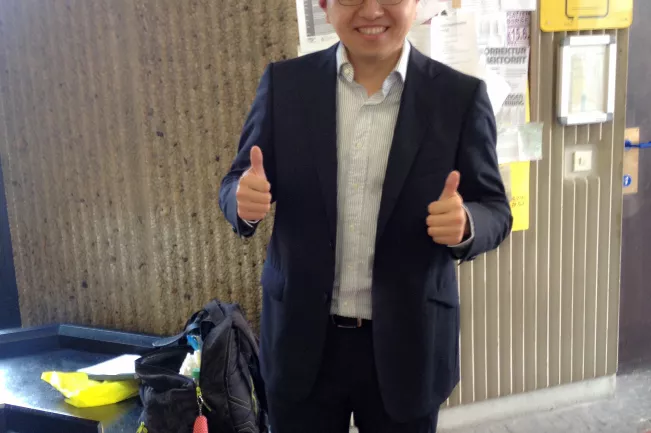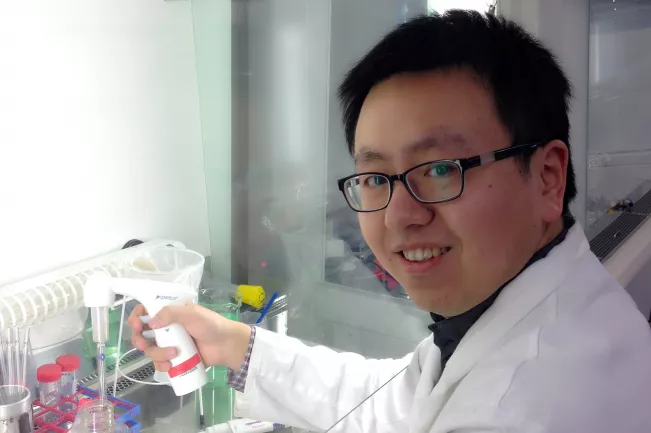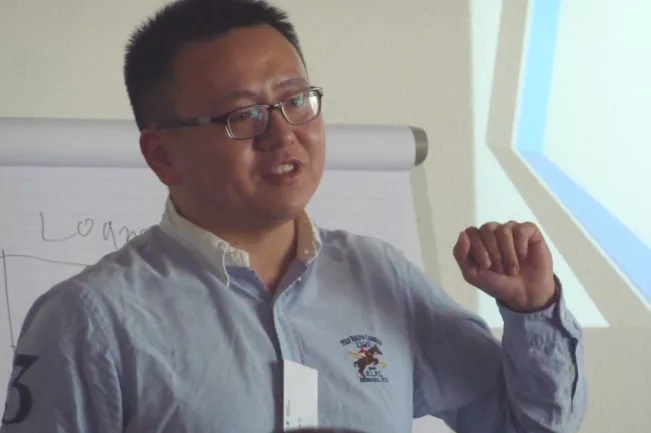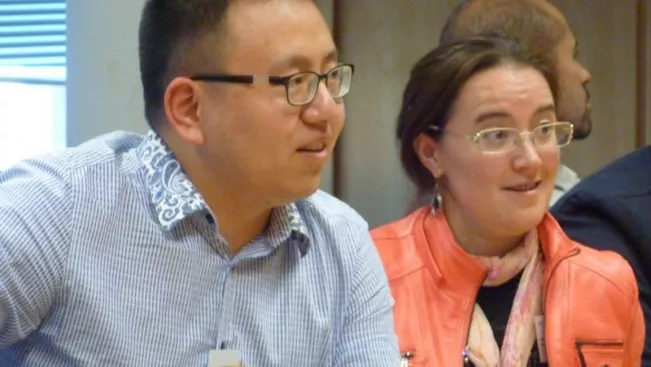Communications and Marketing | Alumni Office

Yu Zhang, PhD in Biology

Zhang knew that after completing his bachelor's degree in biotechnology and master's degree in biomedical engineering at Beihang University in Beijing, he wanted to do his doctorate abroad. He decided in favour of Germany and H-BRS after taking part in the SpaceLife Summer School organised by the German Aerospace Centre (DLR). H-BRS is an associated partner here, specifically with biology professor Edda Tobiasch: ‘I jumped at the chance to work in Prof Tobiasch's laboratory at H-BRS. At first I was a little worried and unsure whether I would be able to complete my doctorate in Germany. Everyone knows that it is very difficult in Germany. But my worries disappeared after I got to know the team and received a lot of support. The campus is small and well organised, you can only feel at home here,’ he smiles. ‘I really appreciate the great support from H-BRS - for me it's the lab group and colleagues from the natural sciences, the Graduate Institute and International Office and the alumni management.’

Is it all a question of familiarisation?
The way he learnt about laboratory work at H-BRS was not something he had experienced in China. ‘Germans are said to like setting up rules and putting everything in the right order. That was a bit strange to me at first. Then I realised what advantages such a way of working brings: I ended up drawing up standard operating procedures myself, creating laboratory rules and trying to bring order to my work. I learnt to work out plans and approach things systematically. This has helped me enormously to prepare my experiments more carefully and logistically, even in my current job.’ Zhang continues: ‘The biggest difference between the German and Chinese way of working is that In Germany, everything is planned in advance and there are clear guidelines. In China, it's not as organised, but it's easier to make decisions and execution is faster. I think it would be very good to combine these two working styles.
‘With a smile, Yu Zhang compares his familiarisation with the scientific working style in the laboratory with his relationship to mineral water: ’I absolutely hated sparkling water, because we don't drink that in China. After five years in Germany, I've not only got used to it, I still drink it every day.’
Zhang is grateful for everything he has learnt from his doctoral mother: ‘Above all, I admire her passion for research. Prof Tobiasch is a role model with her commitment to stem cell research. Every day when I left the lab, I could still see the light on in her office. She corrected our work, wrote grant applications and edited manuscripts even when she was on holiday.
As an employee in Tobiasch's laboratory for ‘Genetic Engineering and Cell Culture’, Yu Zhang was also a mentor for students from the USA, Canada and Great Britain, who were allowed to work in the laboratory for a summer as part of the DAAD ‘Research Internships in Science and Engineering’ programme.

The research team - a strong companion
Cultural events such as the Christmas market, carnival, Rhine in Flames and the Chinese Spring Festival are an integral part of his life in Bonn. Zhang played in a Chinese basketball team that met weekly. He will never forget an excursion with the lab group at the beginning of his stay in Germany: ‘It was a trip with the whole research team to a castle on the Rhine on my second day in Germany. We drove by car just a few metres from the Rhine and the view was fantastic. We had dinner together in an old castle. To be honest, I was a bit nervous at first because I didn't know anyone yet. I had only exchanged a few emails with Prof Tobiasch beforehand. But after this trip, I felt in good hands and happy. We spent the next five years working, discussing and celebrating together. We became good friends and still keep in touch regularly.’
Another event that was of great significance not only for Zhang was the ceremony for the award for the best doctoral student - one of many awards that Zhang received for his extraordinary achievement: ‘I was the first doctoral student to receive this award from H-BRS for the best doctoral thesis from President Prof Hartmut Ihne in person. This was the very best gift after five years of research work in Germany. I would like to thank the university wholeheartedly for its support. I can still remember exactly what my doctoral supervisor Prof Tobiasch said that day: ‘Yu, whenever and wherever you are, if you need my help, just let me know. We'll stay in touch.’ - At the first International Alumni Conference at H-BRS in September 2015, we met again in person and immediately discussed future joint projects.

Curiosity is the key to success
"H-BRS means comfort, warmth and joy in my heart. Now I work as a manager and expert in the largest cell and gene therapy company in China. In a single day, I have to answer more than 30 calls, the work is stressful. On the other hand, there is not so much contact between colleagues and there is not so much time to talk or socialise. I miss my time at H-BRS, which was more organised and personal."
Zhang has a few tips for current and future students. You should savour your time at university: "It's the best time to learn something systematically. You won't have the time later in your career. And don't think that something is not useful at the moment, but insist on continuing to learn. When I was studying at home for lectures that didn't interest me that much, I carried on learning anyway. And today, what I've learnt is suddenly relevant and I regret that I didn't study more." Another piece of advice: "Always be curious, during your studies, but also later in your career (...) I have learnt that opportunities only arise for those who prepare well, and success comes when you put in a lot of effort." Zhang herself has proven how curiosity and hard work not only open doors, but also leave doors open.
Text: Marion Ender, Student Assistant in Alumni Management and student on the Master's degree programme in International Media Studies - a collaboration between Hochschule Bonn-Rhein-Sieg, the University of Bonn and Deutsche Welle Akademie.